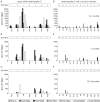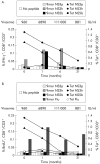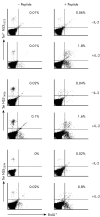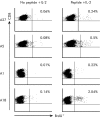Early impairment of hepatitis C virus specific T cell proliferation during acute infection leads to failure of viral clearance
- PMID: 16484505
- PMCID: PMC1856340
- DOI: 10.1136/gut.2005.080077
Early impairment of hepatitis C virus specific T cell proliferation during acute infection leads to failure of viral clearance
Abstract
Background and aims: Cellular mediated immunity (CMI) is thought to play a key role in resolution of primary hepatitis C virus (HCV) infection. However, CD4+ and CD8+ T cell responses are also generated during acute infection in individuals who become chronic, suggesting that they developed a defective CMI. The aim of this study was to verify if and when such immune dysfunction is established by measuring the breadth, magnitude, function, and duration of CMI in a large cohort of subjects during the natural course of acute HCV infection.
Methods: CMI was comprehensively studied by prospective sampling of 31 HCV acutely infected subjects enrolled at the onset of infection and followed for a median period of one year.
Results: Our results indicated that while at the onset of acute HCV infection a measurable CMI with effector function was detected in the majority of subjects, after approximately six months less than 10% of chronically infected individuals displayed significant CMI compared with 70% of subjects who cleared the virus. We showed that progressive disappearance of HCV specific T cells from the peripheral blood of chronic patients was due to an impaired ability to proliferate that could be rescued in vitro by concomitant exposure to interleukin 2 and the antigen.
Conclusion: Our data provide evidence of strong and multispecific T cell responses with a sustained ability to proliferate in response to antigen stimulation as reliable pharmacodynamic measures of a protective CMI during acute infection, and suggest that early impairment of proliferation may contribute to loss of T cell response and chronic HCV persistence.
Conflict of interest statement
Conflict of interest: None declared.
Comment in
-
Cellular immune responses against persistent hepatitis C virus: gone but not forgotten.Gut. 2006 Jul;55(7):914-6. doi: 10.1136/gut.2005.087304. Gut. 2006. PMID: 16766748 Free PMC article.
References
Publication types
MeSH terms
Substances
LinkOut - more resources
Full Text Sources
Medical
Research Materials




